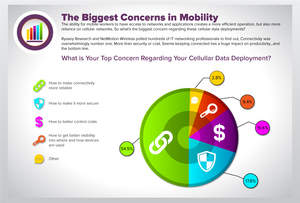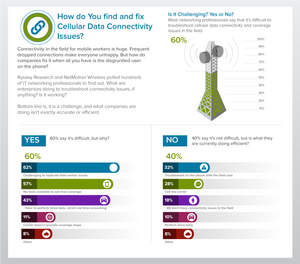SEATTLE, WA--(Marketwire - Mar 12, 2013) - Rysavy Research and NetMotion Wireless today announced the results of their Trends in Enterprise Cellular Network Data Usage survey. Carefully analyzing responses from more than 400 networking professionals in a variety of industries, they discovered that connectivity challenges, a lack of visibility into the performance of deployed assets and troubleshooting difficulties were the highest ranked concerns, significantly higher than concerns about security or controlling costs. Respondents also reported difficulty selecting carriers based on their number one priority -- coverage quality -- and then measuring and troubleshooting that coverage in real-time.
The survey defined cellular data deployments as technology deployments that involve enterprise mobile employees accessing business applications -- such as Computer Added Dispatch (CAD), work order or CRM applications -- through cellular data networks in the field. Questions were limited to the usage of cellular data only (not voice) by mobile employees on company-owned devices such as laptops, tablets or handhelds.
The full report is now available for free download at: http://discover.netmotionwireless.com/TrendsinCellularNetworkDataUsage_SurveyReport.html
Respondents overwhelmingly stated that their mobile data deployment is critical to their organization's success. The survey also revealed five critical gaps companies are facing in their mobile data deployments:
Connectivity is the top Concern: Improving connection reliability was cited three times more often than other challenges, including security and cost control. Breaks in connectivity threaten the productivity of employees and can become a source of job dissatisfaction. Intermittent connections also strain customer service quality and response times while hampering IT support resources.
A Need for Troubleshooting Tools: Respondents cited a lack of tools that help troubleshoot the everyday challenges with cellular networks that their employees are using to access applications and data, like dropped connections, slow data transfer, no ability to connect and other issues. While more than half reported they have no tools for troubleshooting, other respondents cited relying on information collected via trouble shooting calls with end users or calling their carrier's help desk. This places a burden on employees to describe their connectivity issues, and does not provide a reliable way to collect real data. Among those with troubleshooting difficulty, common challenges included: replicating user issues, visibility into true coverage, and the cost, resources and reliability of drive tests.
Choosing Carriers is Difficult: Thirty-one percent of respondents said they find the process of selecting a cellular carrier to be challenging, mostly because they weren't sure which carriers deliver the best coverage. Among those who said that selecting a carrier is not a challenge, the top criteria for selection is coverage quality. This factor was mentioned more than twice as often as any other. Difficulty in carrier choice is commonly caused by a lack of empirical data about connection reliability, throughput and levels of use.
Tracking Inventory Should be Easier: Forty percent of respondents admitted it was difficult to track mobile inventory. This group complained about the time that manual methods take and the lack of automated-inventory tools. One-third report the problem is a lack of visibility into either the use of the modem, or the identity of the modem's user.
No True way to Measure Cellular Performance: Nearly one-half indicated they have no methods to gather data on their cellular data deployments. Respondents were asked about their ability to measure certain aspects of cellular data use, including 2G/3G/4G usage, disconnection rates, application use and coverage trouble areas/dead zones. Less than one quarter of respondents indicated they could measure any one of them. Nearly one-half said they could not measure any of them. The ability to gather these statistics impacts the ability to give field workers reliable connections and performance, keep investments right-sized for the business and costs under control.
"Organizations need visibility and management tools for these cellular networks and the devices used by employees to increase the success of their data deployments," said Peter Rysavy, President, Rysavy Research. "Without it, they're driving blind and can't tackle even the simplest task, like selecting the best performing carrier or troubleshooting dropped connections. What's needed is ongoing, all-encompassing visibility; that's what it will take for a business to improve their return on investment."
Rysavy Research defines a total solution as one that can:
- measure, track and provide visibility into how the cellular data assets are used;
- reveal where those assets are performing well or poorly;
- provide actual when-and-where performance and connectivity data for speedy troubleshooting;
- and show which carriers provide the best connections and value within the organization's specific service area, based on data collected by devices carried by actual users in the field.
Rysavy Research and NetMotion Wireless are holding a webinar on Tuesday, March 19, at 10:00am PT / 1:00pm ET to provide an overview and analysis of the results, and its effect on industries with mobile data deployments. Sign up for the free webinar at:
https://www.techwebonlineevents.com/ars/eventregistration.do?mode=eventreg&F=1005569&K=CAA1AC
About Rysavy Research
Rysavy Research, LLC specializes in wireless technologies including Wi-Fi, Bluetooth, 3G to 4G, WiMAX, LTE and LTE-Advanced, wireless security, M2M, mobile commerce, and mobile platforms. We have expertise in spectrum, including demand, capacity, and spectrum sharing. We also provide deep technical insight into technology capability, balanced with a thorough understanding of market dynamics. We have been doing this for over eighteen years, are highly respected, and are well connected.
About NetMotion Wireless
NetMotion Wireless develops software to manage, secure and optimize wireless data deployments for organizations with mobile field workers. The company's products address the unique challenges introduced by the use of wireless. Mobility XE, the market's most deployed mobile VPN, increases mobile worker productivity by keeping them connected as they move in and out of wireless coverage and roam between networks. And Locality, the first and only cellular network performance management software, provides the detailed device, network, modem and application information organizations need to maximize their wireless investments. More than 2,000 of the world's most respected enterprise, government, utility, healthcare, public safety, insurance and other organizations rely on NetMotion Wireless to improve their mobile productivity. The company is headquartered in Seattle, Washington. Visit www.netmotionwireless.com
NetMotion and NetMotion Mobility are registered trademarks of NetMotion Wireless, Inc. Mobility XE and Locality are trademarks of NetMotion Wireless, Inc. All other trade names, trademarks and registered trademarks are the property of their respective owners.
Contact Information:
Media Contact:
Lindsay Stril
VOXUS PR
253-444-5443

